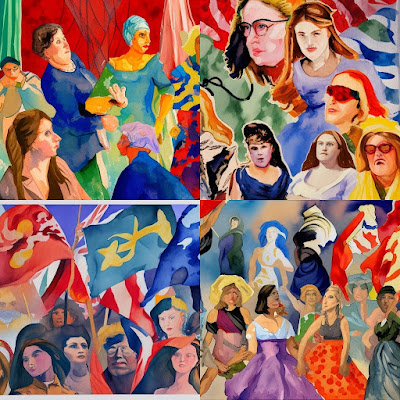New research on vocationalization in international development studies education
The latest published outcome of my fruitful research and writing partnership with Daniel Esser is a new article in Learning and Teaching where we discuss Countering the risks of vocationalisation in Master's programmes in International Development (gated access).
As always, there is also an un-gated pre-print version of the article:
In more academic language we ask for re-thinking the nature of development studies, re-discovering its critical roots and re-occupy what once was a progressive educational field:
Your comments, links to case studies or articles and feedback is much appreciated!
As always, there is also an un-gated pre-print version of the article:
We review the ontological and pedagogical origins of International Development graduate education in the context of increasing pressures to 'professionalise' graduate curricula. We apply Giroux's concept of 'vocationalisation' to argue that professionalisation risks undermining the field's intellectual foundations in an elusive quest to equip students with functional rather than intellectual skills. Acknowledging ever-growing competition among graduates for gainful employment in this sector, we argue that instructors of International Development should recommit to the field's reflective tradition by creating spaces for transformative education and develop a repoliticised ethos that critically engages global capitalism.What we discovered when we wrote the article was how these debates have a global reach-Daniel and I both studied in the UK and now our academic homebases are in the U.S. and Sweden respectively and all three systems are forced to engage with ‘voationalization’ in different ways; therefore, our reflections should be viewed as an entry point to a debate that goes beyond finger-pointing at professional schools, the pressure to generate (overseas) student fees or demands from the ‘aid industry’.
In more academic language we ask for re-thinking the nature of development studies, re-discovering its critical roots and re-occupy what once was a progressive educational field:
we maintain that International Development only stands a chance to change dominant structures and approaches if it succeeds in at least semi-autonomously defining and pursuing its objectives of critical education. (...)We realize that this is only the starting point for a broader discussion that will require more exchanges, comments and research on the nuances of development studies education-including voices from students, the ‘aid industry’ and teachers who have responded to these trends already.
There is no hope to move beyond the kinds of hand-pump type quick fixes to development challenges if the field allows outsiders to frame its pedagogical agenda. For those scholar-teachers who agree that ‘the ultimate aim of [scholarly] production is not production of goods, but the production of free human beings associated with one another on terms of equality’ (Chomsky 2002: 26), our principal responsibility as educators is to assist students in challenging what Giroux has termed ‘critical’ but nonetheless consciously apolitical stances of scholarship and ‘hegemonic’ stances that seek to collaborate with and benefit from industry leadership (...). This requires a rediscovery of more radical approaches that leverage digital technologies, facilitate knowledge creation between the global North and South, and recreate a faculty ethos that combines scholarship with a commitment intellectually to re-‘occupy’ the spaces of debate that have been allowed to determine what ‘useful’ higher education entails.
Your comments, links to case studies or articles and feedback is much appreciated!
Tobias Denskus and Daniel E Esser:
Countering the risks of vocationalisation in Master's programmes in International Development,
Learning and Teaching, 2015, Vol.8, No.2, 72-85, http://dx.doi.org/10.3167/latiss.2015.080205
Countering the risks of vocationalisation in Master's programmes in International Development,
Learning and Teaching, 2015, Vol.8, No.2, 72-85, http://dx.doi.org/10.3167/latiss.2015.080205





Comments
Post a Comment